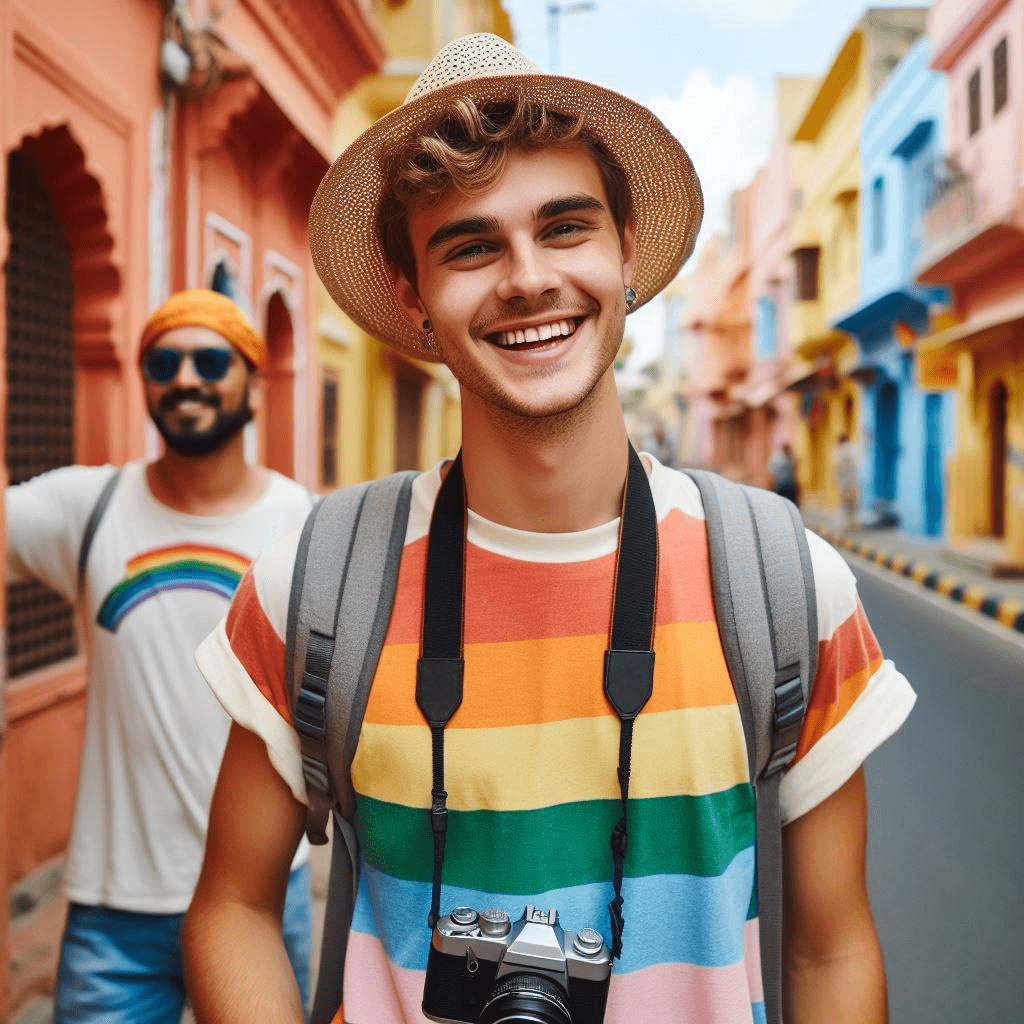India offers a warm welcome to travelers, but understanding the cultural and legal landscape is essential for LGBTQ+ visitors. Here’s what you need to know to plan a safe and fulfilling trip.
Legal Landscape
- Homosexuality is legal: Since 2018, same-sex relationships have been decriminalized, a major step forward. However, same-sex marriage and adoption are not yet recognized.
- Public displays of affection (PDA): PDA is generally frowned upon in India, regardless of sexual orientation. Keep affectionate gestures private to avoid unwanted attention, especially in rural or conservative areas
LGBTQ+ Scene in India
India’s major cities and tourist hubs are more open-minded, offering spaces where LGBTQ+ travelers can feel comfortable:
- Mumbai and Delhi: These cities have vibrant, though discreet, LGBTQ+ communities. Look for events like Delhi Queer Pride (usually held in November) or the KASHISH Mumbai International Queer Film Festival (typically in May or June) to connect with locals and celebrate diversity.
- Goa: Popular tourist destinations like Goa’s beaches (Candolim, Baga) are known for more relaxed attitudes. You’ll find LGBTQ+-friendly cafes and bars, especially in Goa’s coastal areas.
- Connect online: Platforms like Queer India (check websites like queerindia.in) or groups like Gay Bombay offer forums and apps to meet locals and get event updates. Download apps like Grindr or PlanetRomeo, widely used in urban areas, to network safely.
Safety Tips
- Practice discretion: Outside major cities, conservative attitudes are common. Avoid PDA, especially in smaller towns or religious sites, to stay respectful and safe.
- Beware of scams: Unfortunately, some scammers may target tourists, including LGBTQ+ travelers. Trust your instincts—if a situation feels off, walk away. Stick to well-known tourist areas and reputable services.
- Emergency contacts: Save local emergency numbers (Police: 100, Tourist Helpline: 1363) and your country’s embassy contact details for peace of mind.
Finding LGBTQ+-Friendly Accommodations
- Research thoroughly: Many hotels and guesthouses in India are welcoming but may not openly advertise LGBTQ+ inclusivity. Check reviews on platforms like TripAdvisor or Booking.com for mentions of inclusivity.
Nightlife and Social Spots
India’s LGBTQ+ nightlife is growing, especially in urban centers:
- Mumbai: Venues like Kitty Su at The Lalit Mumbai host LGBTQ+-friendly nights. Check social media for pop-up events like Queer Azaadi Mumbai.
- Delhi: Bars in Hauz Khas Village, like Auro Kitchen & Bar, occasionally host inclusive events. Look for updates via local LGBTQ+ groups.
- Goa: Beachside bars in Calangute or Morjim, like Chronicles, are popular with diverse crowds.
- Tip: Ask your hotel concierge or check platforms like Gay Bombay for the latest event listings. Always confirm the venue’s vibe before heading out.
LGBTQ+ Festivals and Events
Timing your trip around these events can enhance your experience:
- Delhi Queer Pride: Held annually in November, this colorful parade in New Delhi is a celebration of diversity, attracting locals and tourists alike.
- KASHISH Mumbai International Queer Film Festival: This May/June event showcases LGBTQ+ films and is a great way to engage with the community.
- Other events: Smaller pride events happen in cities like Bangalore, Chennai, and Hyderabad. Check local LGBTQ+ forums for dates.
Cultural Etiquette
- PDA context: In India, close physical contact between same-sex friends (e.g., holding hands or hugging) is often platonic, especially in states like Uttar Pradesh or Rajasthan. Don’t misinterpret these gestures as romantic.
- Respect local norms: Avoid overt displays of affection, especially in conservative areas like rural Rajasthan or temple towns (e.g., Varanasi). A quick side hug or hand-holding is usually fine but use discretion.
Solo LGBTQ+ Travelers
- General safety: India is generally safe, but solo travelers, especially women, may face occasional stares or unwanted attention. Stick to well-lit, tourist-friendly areas after dark.
- Join group tours: Consider LGBTQ+-friendly group tours like those offered by Out Adventures or Indjapink, which cater specifically to queer travelers. These tours cover highlights like the Taj Mahal, Jaipur’s palaces, or Kerala’s backwaters, ensuring safety and camaraderie.
- Connect locally: Use apps or forums to meet trusted locals for city tours or dining companions.
Dress Code and Cultural Sensitivity
- Modest attire: Dress respectfully, especially at religious sites like temples or mosques. For women, opt for loose-fitting clothes covering shoulders and knees (e.g., kurtas or palazzo pants). Men should wear long pants and shirts, avoiding shorts in sacred places.
- Cultural tip: Bright colors are celebrated in India, so feel free to embrace vibrant scarves or accessories while keeping modesty in mind. For example, a light cotton kurta is both stylish and respectful.
Additional Resources:
- IGLTA (International Gay & Lesbian Travel Association): https://www.iglta.org/
- World Nomads – LGBTQ+ Travel in India: https://www.worldnomads.com/in-the-news/travel-and-lgbtqi
Categories :


